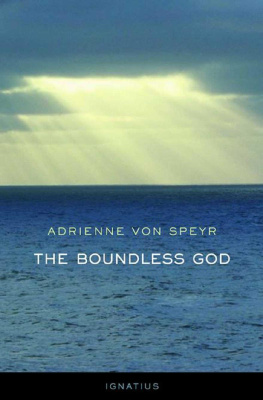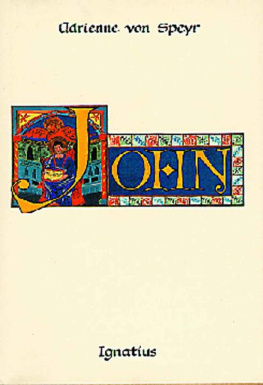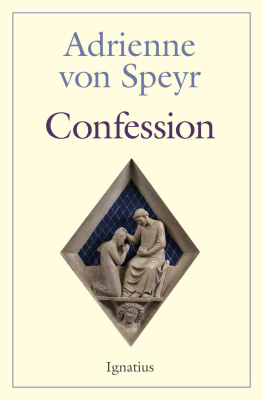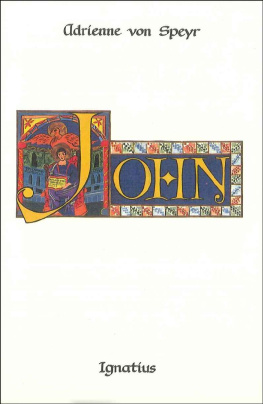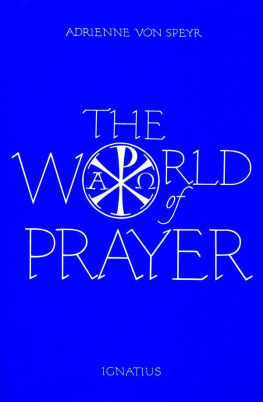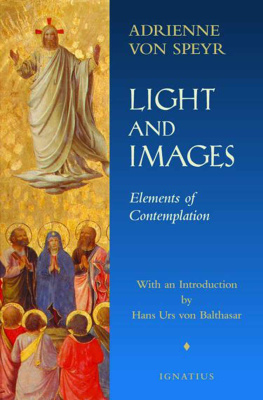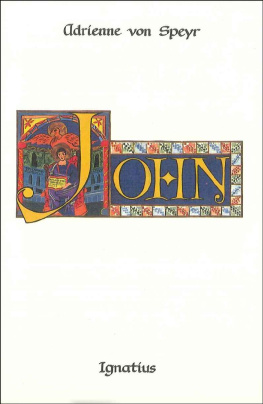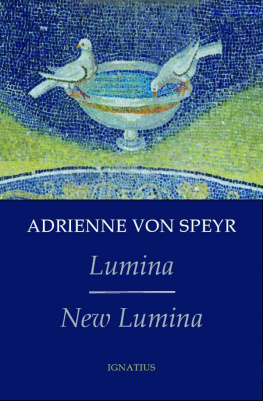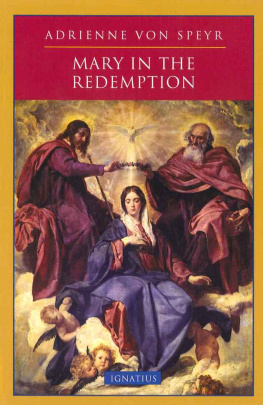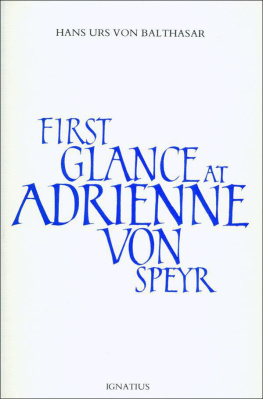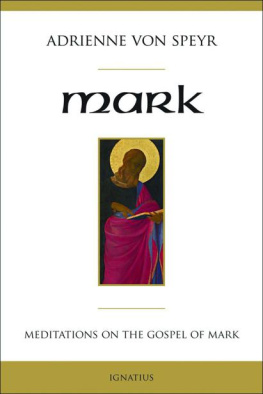Adrienne von Speyr - Boundless God
Here you can read online Adrienne von Speyr - Boundless God full text of the book (entire story) in english for free. Download pdf and epub, get meaning, cover and reviews about this ebook. year: 2004, publisher: Ignatius Press, genre: Religion. Description of the work, (preface) as well as reviews are available. Best literature library LitArk.com created for fans of good reading and offers a wide selection of genres:
Romance novel
Science fiction
Adventure
Detective
Science
History
Home and family
Prose
Art
Politics
Computer
Non-fiction
Religion
Business
Children
Humor
Choose a favorite category and find really read worthwhile books. Enjoy immersion in the world of imagination, feel the emotions of the characters or learn something new for yourself, make an fascinating discovery.
- Book:Boundless God
- Author:
- Publisher:Ignatius Press
- Genre:
- Year:2004
- Rating:4 / 5
- Favourites:Add to favourites
- Your mark:
- 80
- 1
- 2
- 3
- 4
- 5
Boundless God: summary, description and annotation
We offer to read an annotation, description, summary or preface (depends on what the author of the book "Boundless God" wrote himself). If you haven't found the necessary information about the book — write in the comments, we will try to find it.
Boundless God — read online for free the complete book (whole text) full work
Below is the text of the book, divided by pages. System saving the place of the last page read, allows you to conveniently read the book "Boundless God" online for free, without having to search again every time where you left off. Put a bookmark, and you can go to the page where you finished reading at any time.
Font size:
Interval:
Bookmark:
THE BOUNDLESS GOD
ADRIENNE VON SPEYR
BOUNDLESS
GOD
Translated by Helena M. Tomko
IGNATIUS PRESS SAN FRANCISCO
Original German edition:
Der Grenzenlose Gott
1955, Johannes Verlag, Einsiedeln
Cover design by Roxanne Mei Lum
2004 Ignatius Press, San Francisco
All rights reserved
ISBN 0-89870-996-2
Library of Congress control number 2003115826
Printed in the United States of America
For Werner
From all eternity, the Father is together with the Son and with the Holy Spirit. He reveals himself to them in a way that is completely divine and receives from them a divine answer. Nonetheless, when the Father created the world, he opened wide the sphere of the eternal in order to include within existence the sphere of the transient as well. He set forth something from his eternity, though not in order to leave what he had created without a connection to eternity, as a unity left to its own devices. God also received what he had created and, therefore, preserved a permanent relationship with his work. His will as Creator remained unchanged with respect to the world, and, in the act of creation, the Creators being was disclosed to the world. He neither withdrew nor became indifferent, but rather he waited for an answer from the created.
His creations first answer was to let itself be created, to let itself become a reality, one whose ultimate meaning was meant to rest in God but that also possessed meaning in its creaturely essence. God separated the water from the dry land, and, in this separation, the earth became an important symbol. The earth is the sure ground on which men can stand. For everything was planned for man, whom God created last of all. He handed over everything to him so that it would belong to him. This handing over was meant with the utmost sincerity and was never revoked. It placed man in a permanent relationship with the surrounding world, which was Gods gift to him. In Gods eyes, occupying man in this way was meant already to be like a prayer, for man was meant to see in created things what God had given him. He was to be able to do this by virtue of his senses and reason, in what he saw, heard, felt, and experienced. He was furnished with a sensory nature and with knowledge, and, through these, he can echo and adjust to the things over which he has dominion. However, God stands behind each and every perception and adjustment. This means, not that God allows himself to be restricted or tied down to the measure of things and experiences, but rather that his voice remains always audible. The more simple things are, the more conceivable God appears. It is not that he allows things to contain him; rather, they are signs of his presence, which can be neither diminished by the finitude of the world nor consigned to a particular space; it nonetheless remains true presence. This presence is something neither vague nor questionable: it is the presence of the Creator toward whom points the meaning that resides in created things. It is not that Gods meaning is made finite in elements, in plants, and in animals, like something exhaustible; but things can be either quiet or loud reminders that the invisible Creator lives, has created them, and, far from abandoning them, has them permanently in his care. The human spirit, which experiences and contemplates these things, is reminded by their presence of Gods existence.
The first beginnings of mans relationship with God he in his relationship to things and to the hidden powers and secrets with which God has invested them for mans sake. Man is appointed as the lord of creation. He is to be permanently concerned with the things of this world in order to make them bend to his will and so to remain faithful to Gods command and adjust to what God expects of him. But, through his growing knowledge of, and dominion over, things, he experiences that an infinite divine knowledge must stand hidden behind them; for the things themselves neither contain God nor betray his ultimate mysteries. They are scattered testimonies and hints that function as such because they are ordered to the searching and questioning of the human spirit. They are created for man to such an extent that they need him in order for their meaning to be revealed. It is therefore understandable that, throughout the millennia, man has never reached the point of being done with the earth and is shown, in ever new forms of work, things and laws that were always in existence in the world but that, having been revealed, lent a related historical meaning to subsequent generations of men. Man, who is created for the honor of God, also honors the Creator through his growing insight into the meaning that God has placed in things, a meaning that is unveiled slowly through the ages. This is the process that one tends to call progress, providing it is not divorced from the intentions of the Creator. Man should work and explore, not for the sake of mere domination and the power that comes with it, but rather in order to remain within the sphere of tasks assigned to him by God.
In addition to creating the earth, God created the sea, which he separated from the dry land and which remains a particularly eloquent symbol for the strength, mystery, and perpetual unfathomableness of God. Man will want to understand more and more about the sea as well and will probably be able to do so. And yet, the sea remains a special object of contemplation: its relative boundlessness and sameness in all its waves and change provides an allegory for God. When a human being surveys the sea, he looks into something unpredictable, something no longer finite; he experiences that behind everything he sees and intuits there is something ever farther; and when he alters his vantage point, this farther proves to be essentially the same as what he already knows. Whereas God created the earth to be hard and sandy, rocky and lush, fertile and covered in age-old ice, he gave to the sea, in all its raging depths, a quality of uniformity: sea water is the same everywhere, and though no wave is ever identical to another, all waves are nonetheless similar and emerge from and into one another. But it is not just in contemplation of, but also in the struggle against, the sea that human beings are reminded urgently of God. Even if man manages to overcome the sea, he never feels he has mastered the element. Man is conscious of his mastery of terrestrial things: he can plough his fields as he sees best, just as his predecessors did; he can increase or impede the fertility of the land. Of course, man remains a mere servant of God even in this, since God either sends or denies the harvest. But Gods predominance emerges more clearly in the image of the sea. Man can navigate it and catch its fish but cannot direct or cultivate it. Each wave tells him this; storm and stillness proclaim it to him, and both are allegories and reminders that provoke more profound reflection and enable him to be detached from himself, his own might, and his boundaries. In surveying the sea, a person who is accustomed to praying can recognize how much of himself God betrays through the sensory world, how loudly he calls and exhorts men, and how clearly he reveals his love of creation, which is as alive today as it was on the first day. All that has been created should be experienced as a communication from God, above all of his greatness and his infinity. The one who creates is greater than his work. Should we try, in faith, to consider this work as the Father does but not get very far with the help of reason, we can try to do so with the help of love. Our own love, however, is not sufficient: what we, as believers, call love is at the most a poor likeness of that which God calls love. For this reason, God has disclosed to us his own love, and faith teaches us, not just to see this love, but to live in it. The more firmly we believe, the more profoundly we learn how to live out of love, not out of our love, but out of Gods love, which can overwhelm us again and again because it is his. Even faith itself, through which we gain access to this love, is a gift of the triune God for us; and through faith we acquire a meaning for the Fathers love hidden in things. In order to encounter this love, we must not limit our reflections to the divine proofs of love that we find in the Old and New Testaments; rather, we may dare to wonder at Gods love in the creation that lies spread out before us.
Next pageFont size:
Interval:
Bookmark:
Similar books «Boundless God»
Look at similar books to Boundless God. We have selected literature similar in name and meaning in the hope of providing readers with more options to find new, interesting, not yet read works.
Discussion, reviews of the book Boundless God and just readers' own opinions. Leave your comments, write what you think about the work, its meaning or the main characters. Specify what exactly you liked and what you didn't like, and why you think so.

